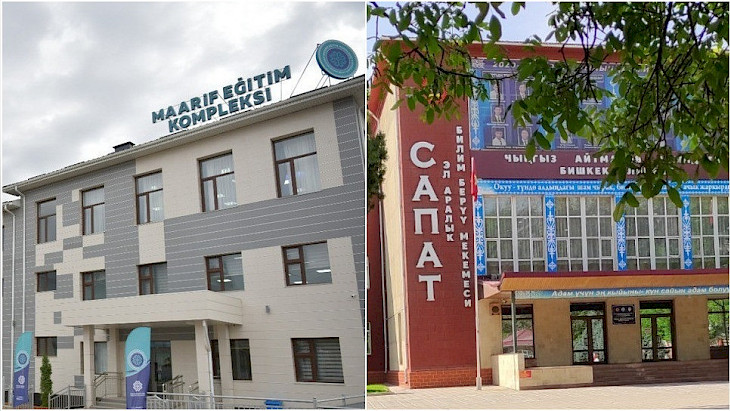At the end of 2024, on December 31, a meeting took place at the Administration of the President of Kyrgyzstan between Deputy Chairman of the Cabinet of Ministers Edil Baisalov and the director of the representative office of the international Maarif Foundation, Hüsnu Bircan, the press service of the Kyrgyz Cabinet reports.
Edil Baisalov announced the decision to transfer the Sapat educational institution network under the management of the Maarif Foundation.
This step is driven by the desire to ensure the best interests of students in the country and trust in the foundation’s reputation as a reliable partner in education, Baisalov stated.
Kyrgyzstan’s decision to transfer the management of Sapat schools, which are linked to Gülen, to the Turkish state-run Maarif Foundation marks a significant shift in the country’s educational landscape and has far-reaching implications, according to an article by Eurasiatoday.ru.
Background:
Founded in 1992, the Sapat network consists of 20 schools serving over 11,000 students across the country and has been recognized as a leading educational institution in Kyrgyzstan.
Turkish President Recep Tayyip Erdoğan has been pursuing followers of the Gülen movement since December 2013, when corruption investigations implicated then-Prime Minister Erdoğan, as well as members of his family and close circle.
Rejecting the investigations as a Gülenist coup attempt and a conspiracy against his government, Erdoğan declared the movement a terrorist organization and launched a crackdown on its members. He intensified the repression following the failed coup attempt on July 15, 2016, for which he blamed Gülen. Gülen and his movement denied any involvement in the coup attempt.
After the failed coup, the Turkish government shut down 1,069 private schools and 15 universities due to their ties with the Gülen movement.
Kyrgyzstan officially announced the transfer of school management on December 31, 2024, after years of diplomatic pressure from Turkey.
This step marks a departure from Kyrgyzstan’s previous stance, which had rejected Turkey’s attempts to close or take over the schools. In 2017, then-President Almazbek Atambayev called the institutions a "source of national pride" and dismissed Ankara’s accusations against the staff.
"Those who call Sapat teachers terrorists should see a doctor," Atambayev said, adding that the schools had widespread public support in Kyrgyzstan and were primarily staffed by local educators.
Regarding the Maarif Foundation, which has taken over the management of these schools, we have previously reported that this Turkish government-backed foundation is specifically tasked with taking control of educational institutions linked to the Gülen movement worldwide.
Possible Consequences:
-
The curriculum will inevitably change to align more closely with Turkish educational standards, which may weaken the unique educational approach of Sapat schools. Teachers and staff will also face employment changes, with some likely being replaced by individuals more aligned with the Turkish government’s views.
-
It is difficult to predict whether the quality of education will decline, but concerns may arise about academic freedom, particularly if the new administration imposes ideological or religious influences that contradict Kyrgyzstan’s secular education system.
-
The very act of transferring school management to the Maarif Foundation is seen as a concession of Kyrgyzstan’s educational sovereignty to foreign influence. This could impact national pride and spark domestic political debates. Moreover, this decision is unlikely to significantly strengthen ties between Bishkek and Ankara. Unfortunately, it appears more like a “loss of sovereignty” in this case.
-
Furthermore, Turkish educators associated with Gülen-affiliated schools have previously faced risks of persecution or extradition. This transition could put teachers in danger, even those who are Kyrgyz citizens.
-
This decision may set a precedent for other Central Asian countries dealing with Gülen-linked institutions, potentially influencing regional education policies.
CentralAsiaLIGHT.org
January 6, 2025

